Alfa Romeo Junior vs Dacia Sandero – Which car suits you better?
Compare performance, boot capacity, efficiency and price at a glance.
Find out which car is the better choice for you – Alfa Romeo Junior or Dacia Sandero?
Costs and Efficiency:
Price and efficiency are key factors when choosing a car – and this is often where the real differences emerge.
Dacia Sandero has a convincingly advantage in terms of price – it starts at 10700 £, while the Alfa Romeo Junior costs 25700 £. That’s a price difference of around 14966 £.
Fuel consumption also shows a difference: Alfa Romeo Junior manages with 4.80 L and is therefore somewhat more efficient than the Dacia Sandero with 5.30 L. The difference is about 0.50 L per 100 km.
Engine and Performance:
Under the bonnet, it becomes clear which model is tuned for sportiness and which one takes the lead when you hit the accelerator.
When it comes to engine power, the Alfa Romeo Junior has a clearly edge – offering 280 HP compared to 110 HP. That’s roughly 170 HP more horsepower.
In acceleration from 0 to 100 km/h, the Alfa Romeo Junior is significantly quicker – completing the sprint in 5.90 s, while the Dacia Sandero takes 10 s. That’s about 4.10 s faster.
In terms of top speed, the Alfa Romeo Junior performs somewhat better – reaching 206 km/h, while the Dacia Sandero tops out at 183 km/h. The difference is around 23 km/h.
There’s also a difference in torque: Alfa Romeo Junior pulls significantly stronger with 345 Nm compared to 200 Nm. That’s about 145 Nm difference.
Space and Everyday Use:
Cabin size, boot volume and payload all play a role in everyday practicality. Here, comfort and flexibility make the difference.
Both vehicles offer seating for 5 people.
In curb weight, Dacia Sandero is clearly perceptible lighter – 1089 kg compared to 1380 kg. The difference is around 291 kg.
In terms of boot space, the Alfa Romeo Junior offers evident more room – 415 L compared to 328 L. That’s a difference of about 87 L.
In maximum load capacity, the Alfa Romeo Junior performs to a small extent better – up to 1280 L, which is about 172 L more than the Dacia Sandero.
When it comes to payload, Dacia Sandero hardly perceptible takes the win – 436 kg compared to 420 kg. That’s a difference of about 16 kg.
Who comes out on top?
Overall, the Alfa Romeo Junior shows itself to be outperforms in nearly all aspects and secures the title of DriveDuel Champion.
It convinces with the more balanced overall package and proves to be the more versatile choice for everyday use.
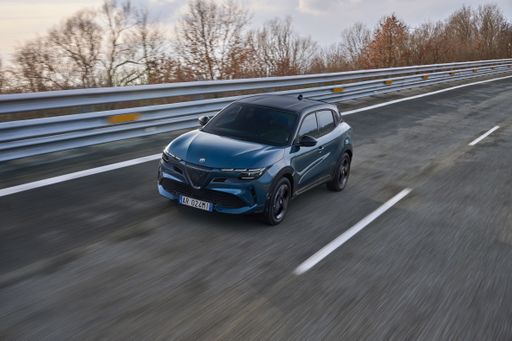 @ Alfa Romeo / Stellantis Media
@ Alfa Romeo / Stellantis Media
Alfa Romeo Junior
Alfa Romeo Junior
The Alfa Romeo Junior captures the essence of Italian design with its sleek lines and compact dimensions, making it an icon of elegance and performance. With a spirited driving experience and a charming retro aesthetic, it appeals to enthusiasts and casual drivers alike. This delightful car embodies the brand's rich heritage while remaining a fun and engaging option for those seeking a unique automotive experience.
details @ Alfa Romeo / Stellantis Media
@ Alfa Romeo / Stellantis Media
 @ Alfa Romeo / Stellantis Media
@ Alfa Romeo / Stellantis Media
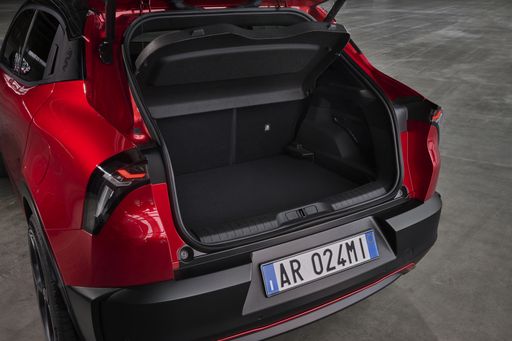 @ Alfa Romeo / Stellantis Media
@ Alfa Romeo / Stellantis Media
Dacia Sandero
The Dacia Sandero stands out as an exceptional value in the hatchback market, offering a blend of practicality and affordability that appeals to a wide range of drivers. Its understated design is complemented by a surprisingly spacious interior, providing ample comfort and functionality for everyday use. With impressive fuel efficiency and a solid reputation for reliability, the Sandero remains a popular choice for those seeking a no-nonsense vehicle without sacrificing essential modern features.
details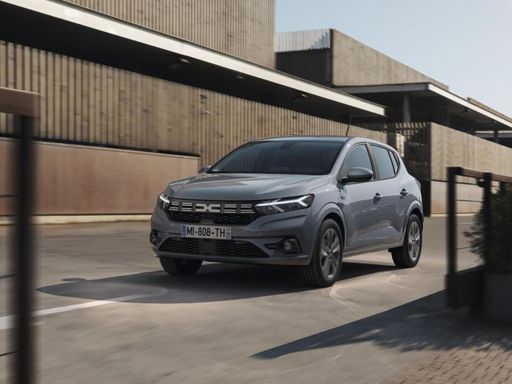 @ Dacia / Renault Group Media
@ Dacia / Renault Group Media
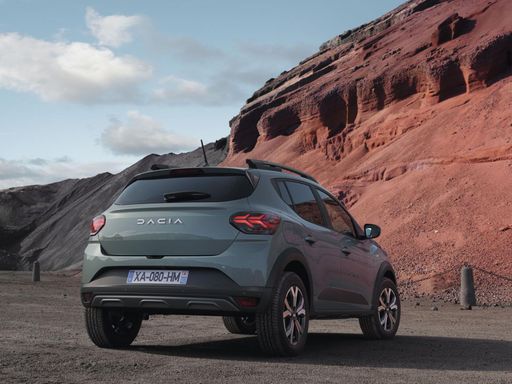 @ Dacia / Renault Group Media
@ Dacia / Renault Group Media
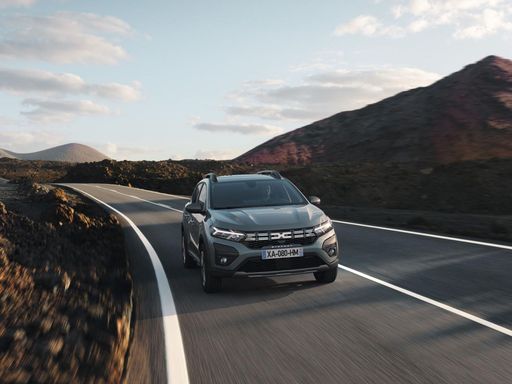 @ Dacia / Renault Group Media
@ Dacia / Renault Group Media
 @ Alfa Romeo / Stellantis Media
@ Alfa Romeo / Stellantis Media
|
 @ Dacia / Renault Group Media
@ Dacia / Renault Group Media
|
|
|
|
Costs and Consumption |
|
|---|---|
|
Price
25700 - 41600 £
|
Price
10700 - 16700 £
|
|
Consumption L/100km
4.8 - 5.4 L
|
Consumption L/100km
5.3 - 7.1 L
|
|
Consumption kWh/100km
15.1 - 17.5 kWh
|
Consumption kWh/100km
-
|
|
Electric Range
344 - 410 km
|
Electric Range
-
|
|
Battery Capacity
0.4 - 51 kWh
|
Battery Capacity
-
|
|
co2
0 - 119 g/km
|
co2
105 - 140 g/km
|
|
Fuel tank capacity
44 - 45 L
|
Fuel tank capacity
32 - 50 L
|
Dimensions and Body |
|
|---|---|
|
Body Type
SUV
|
Body Type
Hatchback
|
|
Seats
5
|
Seats
5
|
|
Doors
5
|
Doors
5
|
|
Curb weight
1380 - 1689 kg
|
Curb weight
1089 - 1209 kg
|
|
Trunk capacity
340 - 415 L
|
Trunk capacity
328 L
|
|
Length
4173 mm
|
Length
4088 - 4099 mm
|
|
Width
1781 mm
|
Width
1848 mm
|
|
Height
1505 - 1538 mm
|
Height
1499 - 1535 mm
|
|
Max trunk capacity
1205 - 1280 L
|
Max trunk capacity
1108 L
|
|
Payload
390 - 420 kg
|
Payload
404 - 436 kg
|
Engine and Performance |
|
|---|---|
|
Engine Type
Electric, Petrol MHEV
|
Engine Type
Petrol, LPG
|
|
Transmission
Automatic
|
Transmission
Manuel, Automatic
|
|
Transmission Detail
Dual-Clutch Automatic, Reduction Gearbox
|
Transmission Detail
Manual Gearbox, CVT
|
|
Drive Type
Front-Wheel Drive, All-Wheel Drive
|
Drive Type
Front-Wheel Drive
|
|
Power HP
136 - 280 HP
|
Power HP
67 - 110 HP
|
|
Acceleration 0-100km/h
5.9 - 9.1 s
|
Acceleration 0-100km/h
10 - 16.7 s
|
|
Max Speed
150 - 206 km/h
|
Max Speed
158 - 183 km/h
|
|
Torque
230 - 345 Nm
|
Torque
95 - 200 Nm
|
|
Number of Cylinders
3
|
Number of Cylinders
3
|
|
Power kW
100 - 207 kW
|
Power kW
49 - 81 kW
|
|
Engine capacity
1199 cm3
|
Engine capacity
999 cm3
|
General |
|
|---|---|
|
Model Year
2024 - 2025
|
Model Year
2024 - 2025
|
|
CO2 Efficiency Class
A, C, D
|
CO2 Efficiency Class
D, C, E
|
|
Brand
Alfa Romeo
|
Brand
Dacia
|
What drive types are available for the Alfa Romeo Junior?
Available configurations include Front-Wheel Drive or All-Wheel Drive.
The prices and data displayed are estimates based on German list prices and may vary by country. This information is not legally binding.
